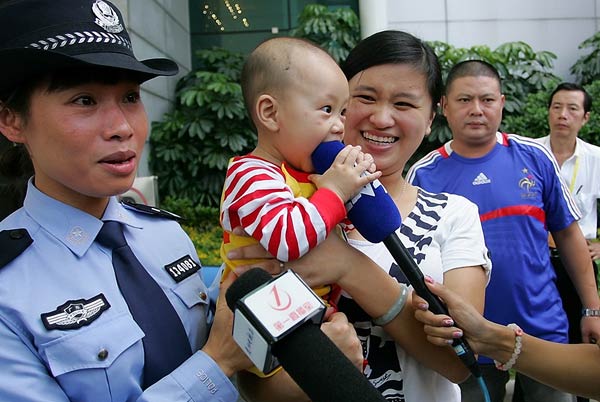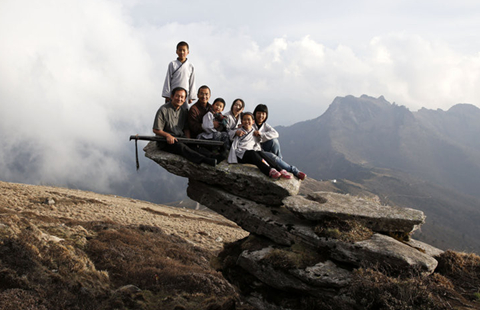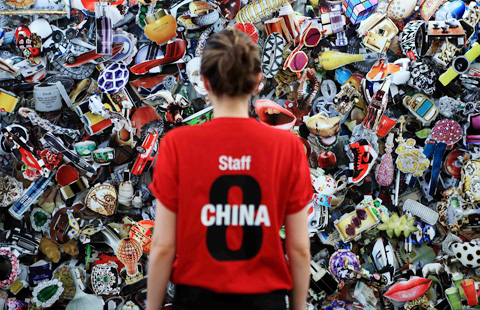Greater efforts needed to combat child trafficking
Updated: 2015-05-07 10:38
By Li Yang(chinadaily.com.cn)
|
||||||||
 |
|
Huang Yuxian, an 8-month-old boy who was trafficked from Guangdong to a small village in Central China's Henan province, was rescued. His mother held him tightly in her arms at the airport in Guangzhou on Sunday. Provided by Yangcheng Evening News |
A 7-year-old girl in Huizhou, Guangdong province, South China, who was missing from home for 16 hours, was rescued from her abductors on May 1. She was lucky, as it is estimated only one out of every 1,000 missing children in China is found.
The authorities have never unveiled the size of the human trafficking market in China. The frequent media reports on police raids on child trafficking gangs, and the universal notices for missing children on lamp posts and on the Internet imply the dirty business has never ceased, the trade is big, and families that have lost children continue to suffer.
The government and the judicial authorities need to take concrete and sustained actions to counter child trafficking.
For the child traffickers, abducting and selling children is easy and profitable. Even if they are caught, their punishments are light.
Most child traffickers are set free after a prison sentence of just a few years. And many of them take up their illegal trade again.
Although people have repeatedly appealed to the lawmakers to introduce harsher penalties for child trafficking, the law has basically remained unchanged. And the public security departments mainly depend on the annual campaign against human trafficking that lasts two to three months to suppress such activities and appease public anger.
For most of each year, the families that have lost children depend on their own efforts and those of other social organizations to search for their loved ones.
Strong demand fuels the child trafficking market.
Most of the buyers of abducted children are from the better-off coastal regions such as Guangdong, Fujian and Zhejiang provinces. Some of the children are abducted from nearby places, some are transported from the poorer inland villages in Guangxi, Yunnan, Guizhou and Sichuan.
In some places in Shandong and Henan provinces, where farmers are more influenced by traditional culture and desperate to have male offspring, some child traffickers even organize underground maternal wards for women from the southwest of China.
It is an open secret that the trade in children would not be able to flourish without some civil servants and police profiting from the illegal business somewhere along the line. Particularly as foster parents must register a legal identity and household permit for the children they buy. Otherwise, it would be impossible for the children to enter school as a legal citizen.
There should be harsher penalties not only for the traffickers but also for civil servants and police who are found to have facilitated or been in any way involved in the trafficking of children. The buyers too need to be punished to deter others from buying stolen children.
The government can also make it a compulsory practice to permanently link some unique bio-characteristics that are exclusive to each baby with their identity registration. This will make much easier to find the blood parents of trafficked children, and save the police tremendous time and money doing the biological tests for the children they find.
The governments in poor regions need to do more to eliminate poverty, increase input in education and strengthen the protection of children's rights. And people making money from selling their own children must be held accountable by law. Poverty and illiteracy are not excuses justifying the infringements upon children's rights.
Besides, China needs to simplify its official adoption procedures, which are too complicated and expensive for many people wanting to adopt children legally.
Last but not least, cracking down on child trafficking should be a mission for the public security departments all year round.

 Cannes Film Festival unrolls star-studded red carpet
Cannes Film Festival unrolls star-studded red carpet
 Amazing artworks in supermarkets
Amazing artworks in supermarkets
 Top 10 venture investors in the world
Top 10 venture investors in the world
 Ten photos you don't wanna miss - May 14
Ten photos you don't wanna miss - May 14
 Classical private school in Qinling Mountain
Classical private school in Qinling Mountain
 Heads of state show you around Xi'an
Heads of state show you around Xi'an
 Cross dressing for Peking Opera
Cross dressing for Peking Opera
 Ten photos you don't wanna miss - May 13
Ten photos you don't wanna miss - May 13
Most Viewed
Editor's Picks

|

|

|

|

|

|
Today's Top News
Xi to give Modi a hometown welcome
Cui rebuffs US criticism on China Sea
China set to delay maiden flight of C919 commercial jet
Police warn 'strange outfits' on subway may cause stampedes
At least six die in Philadelphia train derailment, scores hurt
Cui: How to get a win-win in Asia
Animated Deng Xiaoping set to hit silver screen this week
Foreign reserves show a record decline in Q1
US Weekly

|

|






